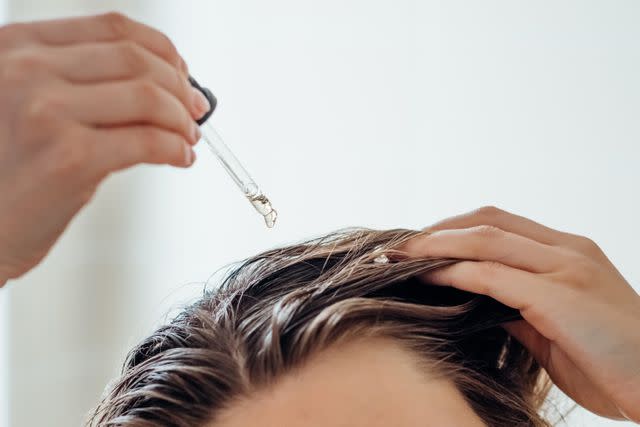Is Hyaluronic Acid the Missing Ingredient in Your Hair Routine?

Getty Images
Although it’s a super popular hydrator in the skincare arena, hyaluronic acid doesn’t always get hyped as a major player in the haircare world. However, it’s an under-the-radar powerhouse often laced into hydrating hair serums, masks, treatments, conditioners and more. “Hyaluronic acid is a common skincare ingredient used to help moisturize the skin,” explains dermatologist Brooke Jeffy, MD. “It works as a humectant meaning it works by attracting and holding water.” According to trichologist Kerry Yates, when applied to hair, specifically “the mid-lengths and ends, hyaluronic acid does a brilliant job of sealing the cuticle, assisting in eliminating frizz, enhancing shine and ensuring the hair looks beautiful overall,” she explains. “Hyaluronic acid is a brilliant addition to haircare formulas.”
Meet Our Expert
Marc Ballance is a celebrity hairstylist and Creative Director of Balance Hair
Brooke Jeffy, MD is a dermatologist in Scottsdale, Arizona and founder of BTWN skincare
Kerry Yates is a trichologist and founder of Colour Collective
Benefits of Hyaluronic Acid for Hair
As a serum or moisturizer, hyaluronic acid works by drawing water into the skin and keeping it there. “This miracle skincare ingredient is hydrophilic in nature, which means it attracts and retains moisture effectively,” Yates explains. “It also helps maintain and regulate moisture levels by acting like a skin barrier, preventing excessive water loss and..soothes and calms irritated or inflamed skin.”
When it comes to hair, the benefits of hyaluronic acid to hair are very much the same. “Hyaluronic acid is a substance naturally found in the body that retains moisture and can hold up to one thousand times its weight in water,” says Celebrity hairstylist Marc Ballance points out that hyaluronic acid can hold up to one thousand times its weight in water, offering hydration that makes hair softer and less frizzy. “It can improve the appearance of dry or damaged hair and make it look fuller and shinier," says Jeffy. Plus, "a hydrated scalp is crucial to optimal hair growth.”
Risks and Side Effects of Hyaluronic Acid and Hair
Hyaluronic acid is considered safe. But for optimal results, you'll want to apply it correctly. “When used on the skin or hair, water should also be in the product or it should be applied on a damp surface,” says Jeffy. “If water is not supplied, then the hyaluronic acid will absorb water from our cells or hair, drying them out instead of hydrating.” She also points out that “it is important that hyaluronic acid is paired with an occlusive ingredient, like an oil, to help hold this water in place and prevent evaporation,” she says. “Hyaluronic acid on hair, like with skin, can actually contribute to dry, brittle hair if not applied to damp hair and in combination with an oil or other more occlusive ingredients.” Luckily, most products that harness the hydrating powers of hyaluronic acid are combined with occlusives or water so all you need is ready to be applied.

Getty Images
How to Use Hyaluronic Acid for Hair
There are many ways to use hyaluronic acid in your hair, but Ballance says his favorite is as a leave-in conditioner. “You can also apply a leave in treatment as a pre-shampoo treatment,” he explains. “Apply it throughout your hair and scalp 15 minutes before you shampoo your hair, concentrating on areas that are causing concern.” Of course, a shampoo or conditioner that contains hyaluronic acid will also do the trick.
One note of caution: never apply a hyaluronic acid-based hair product to dry hair. “ the benefits of hyaluronic acid include locking in and maintaining the moisture so it wouldn’t make much sense to apply to already blow dried hair as the moisture is gone,” Ballance says. Jeffy stresses the importance of hair being wet. “Hyaluronic acid should be applied to wet or damp hair and massaged into the scalp and always be followed with an oil or thicker styling product,” recommends Jeffy.
Hair Type Considerations When Using Hyaluronic Acid
“Generally speaking, there isn’t a hair type I wouldn’t recommend for using hyaluronic acid as it’s a really light substance,” shares Ballance. If your hair is in any way dry, frizzy or damaged, you'll likely will see the benefits. According to Yates, “hyaluronic acid is brilliant for curly hair, which is usually plagued with dryness strands based on the physical shape of each strand and challenges with the scalp,” she explains. “Also, color treated hair, especially highlighted hair, will always benefit from haircare products formulated with hyaluronic acid.” Here’s why: it’s all about hydration. “Permanent coloring treatments or bleach will damage the cuticle of the hair strand and hyaluronic acid will help to alleviate the negative effects of cuticle damage,” Yates says. Just be sure to check the other ingredients in a given product to ensure they work with your hair type.
For more InStyle news, make sure to sign up for our newsletter!
Read the original article on InStyle.


